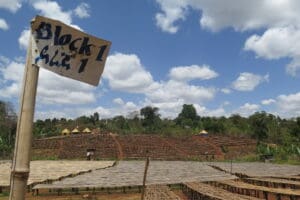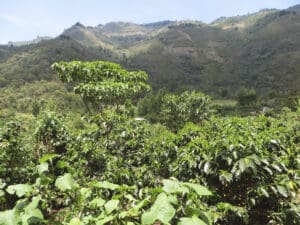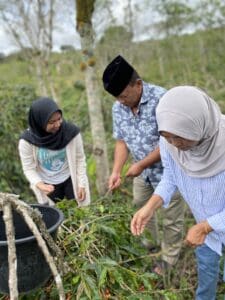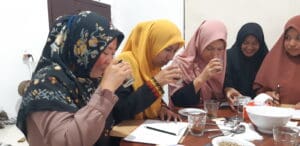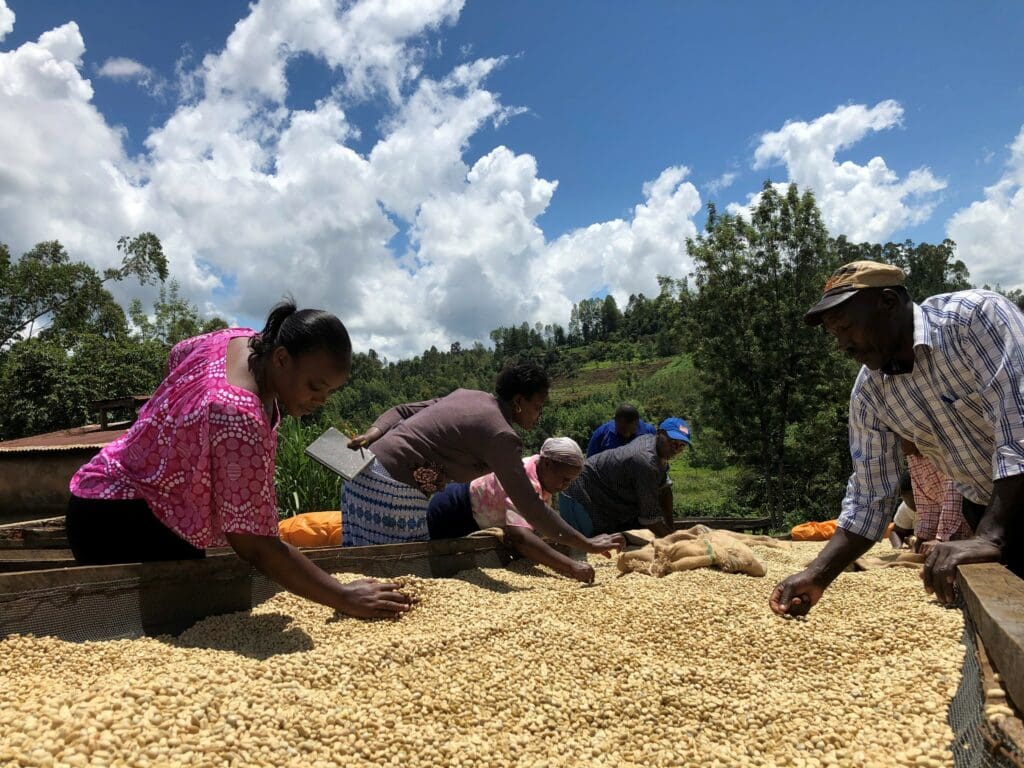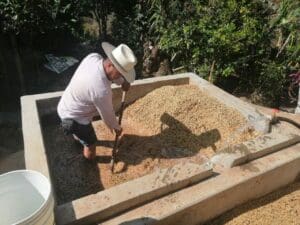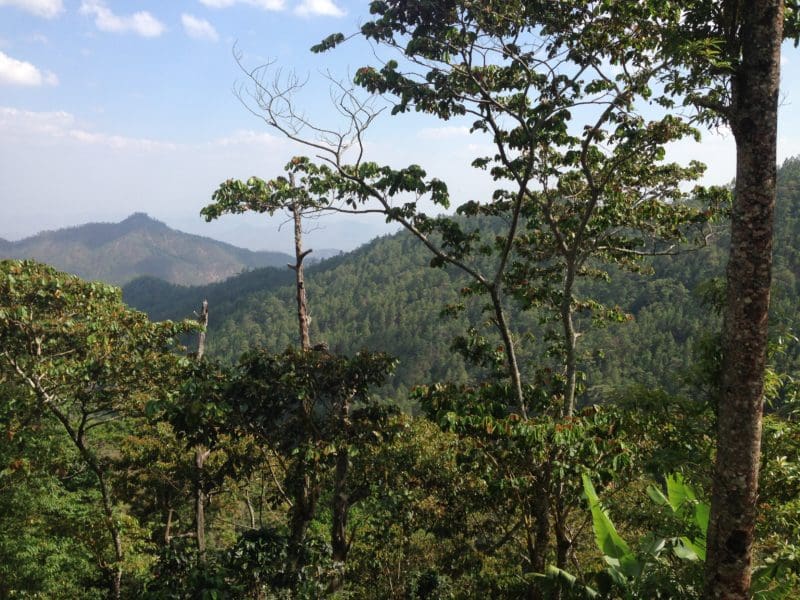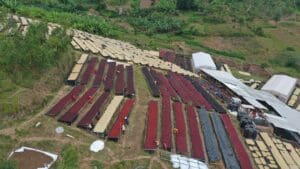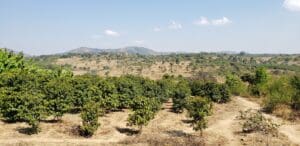The holidays are here! If you're still planning your Holiday Blends or want to add another Single Origin to your winter offerings, there is still time! Here are our suggestions for fresh arrivals worthy of a celebration.
Washed Coffees from Guracho Washing Station, Guji Zone, Ethiopia
The availability of washed coffees at TGR is cause enough for celebration. Few coffee-producing countries offer as much diversity in quality and cup profile as Ethiopia. The range of floral, fruit and botanical qualities one can experience in coffees from this single country is incredible. The subtle variations in growing conditions within Ethiopia's Guji Zone yield so many unique profiles that it could be considered a country of its own!
The flavor profile of washed coffees from the Guracho Washing Station tends towards peach, honey, lemon, and rose with bright, juicy acidity and a full, satiny body. We have three beautiful lots remaining:
- P-11081-2, 18 bags: Bright and complex with flavors of lemon-lime, grapefruit, white wine, floral tones, ginger, and raisin
- P-11110-1, 147 bags: Blackberry, plum, jasmine, white wine, lime, ginger, and kiwi with elegant, juicy lime acidity
- P-11195-1, 52 bags: Notes of red berry, melon, flowers, strawberry candy, vanilla-crème, dark chocolate, and grapefruit
The lots are available now on the West Coast; pair one with the Ketiara from Sumatra for a delightful blend.
Fair Trade Organic CODECH, Huehuetenango,
Guatemala (CTI and TGR)
Tucked in the Sierra de Los Cuchumatanes, the highest mountain range in Central America, the Coordinadora de Organizaciones de Desarrollo de Concepcion Huista, or "CODECH," produces some of the best Fair Trade & Organic coffees not just in the department of Huehuetenango, but in all of Guatemala. CODECH is comprised of three base cooperatives: Asociación de Desarrollo Integral Productivo Yamanonh (ADIPY), Asociación de Desarrollo Integral Tierra Hermosa Concepcionera (ADINTHEC), and Asociación de Agricultores Tineco (ADAT) – and its members represent the Popti, Mam, and Q'anjob'al branches of the Mayan family.
After our first visit in late 2009, CODECH started a micro-lot program by classifying producers according to their farms' elevations. Since 2012, we've assisted in organizing an internal cupping competition for single producers that now is an annual event.
The micro-lots often exhibit the classic Huehue blackberry and chocolate flavors but can also be refined with elegant acidity and notes of stone fruits and citrus. Several Fair Trade Organic community and single-producer micro-lots landed at the end of the summer, and a few coffees remain:
East Coast at CTI:
- ADINTHEC/ADAT Blend: Plum, vanilla, lemon, mildly floral, orange, toffee, and brown sugar
West Coast at TGR:
- Juana Escobar Gaspar: Chocolate, toffee, almond, cherry, grape, and Honeycrisp apple
- Jesus Perez Juan: Green apple, blackberry, grape, spice, cane sugar, and peanut butter
- Nicolas Recinos Escobar: Lemon, chamomile, honey, raisin bran, graham cracker, green grape, butter, and caramel
- ADAT Blend: Vanilla, berry, dark chocolate, plum, spice, and coconut
- ADIPY Blend: Green grape, vanilla, cane sugar, berry, and spice
Whether you want comfort or adventure, CODECH is on point as a base for your wintery blends.
Fair Trade Organic Koperasi Ketiara, Sumatra,Indonesia
What's better on a cold morning than a hot cup of rich, sweet Sumatran coffee?
Since they began exporting in 2013, Kopepi Ketiara quickly established itself as one of the most-respected Fair Trade cooperatives in the Gayo Highlands. Their reputation results from the excellent quality of their coffees, efficient contract performance, and a focus on innovation and continuous improvement. Since their first exports, we have been fortunate to work closely with Kopepi Ketiara and have seen this group evolve into the leader within the Aceh coffee-producing region. They currently have 1502 producer members in 19 villages in Aceh Tengah and Bener Meriah.
Two lots of tasty coffee from Ketiara are available to choose from now on the West Coast. We love this coffee for its clean yet distinct origin-character-- sweet, spicy earth, clean wood, grape, bell pepper, and bright citrus-- and for the people who produce it. So if you want a clean, classic coffee, this one's for you!
Fair Trade Organic Women-Produced KOKOWAGAYO, Sumatra, Indonesia
For many roasters and coffee drinkers, nothing like smooth Indonesian coffee evokes winter. We are fortunate to have a stellar lot of Women-Produced KOKOWAGAYO to share with roasters this season.
KOKOWAGAYO is short for Koperasi Kopi Wanita Gayo, a woman-owned and managed cooperative. The cooperative was formed in North Sumatra, in the province of Aceh, in 2014. We have been working alongside Kokowagayo since its inception and are continuously impressed by its dedication to quality and creating opportunities for women in their community.
In traditional cooperatives, women are often left out of essential decision-making conversations and are not granted equal power or access. Kokowagayo is the only all-woman cooperative in Sumatra, and over the years, they have created opportunities for women in leadership and financial training for women producers. In addition to coffee production, the members are also involved in vegetable and fruit production (such as avocados and oranges), livestock, and compost production, which is essential for diversifying their income.
Our current offering has classic notes of apple, brown sugar, walnut, wood, and bell pepper with medium acidity and body. The balanced and versatile flavor profile plays well with other coffees to craft a crowd-pleasing (and affordable) cup. Try it with one of the Tanzanian coffees for a unique blend.
Bloom Iyego FCS, Mununga Factory, Kenya
Choose a coffee with a purpose to celebrate the holidays!
During the harvest season in Kenya, more than 1,000 farmers may deliver coffee to a washing station. However, the process is error-prone, involves long delays, and suffers from a lack of communication. In addition, deliveries are manually recorded, and it may take weeks for a cooperative to know the full harvest result.
NKG Bloom has moved the system online through mobile, desktop, and agronomy apps. Cherry-weighing scales are now connected to the factory manager's laptop; each time coffee is weighed, the transaction is logged in the system, a receipt is printed, and a text message with transaction details is sent to the farmer's phone. Records are now clear, accurate, and always up to date. During the first harvest that the system was online, more than 150,000 deliveries were digitized and shared on farmers' phones.
Under NKG Bloom, Tropical Farm Management Kenya (TFMK) and farmer-owned cooperatives are increasing their investments in washing-station infrastructure and technical assistance for farmers. In addition, extension officers work closely with co-op members to address low yields and climate- and disease-based agronomy challenges.
Building on prior efforts by TFMK, NKG Bloom is additionally working with cooperatives on certification training, the dispersal of fertilizer and other soil-nutrient inputs, and working-capital loans for infrastructure investments and other needs.
Atlas has sourced coffee from the Iyego Farmers Cooperative Society for years, and we're excited to offer two washed micro-lots from their new crop through the Bloom program this season! Only the AB Mununga remains, which exhibits flavors of raisin, cashew, cherry, spice, toffee, honey, and baked apple. Sourcing Bloom coffees provides smallholder farmers with the services and resources they need to run their farms as profitable businesses. Add the Mexico Finca Teresa to provide deep sugar-browning tones to a Bloom blend.
Bloom Finca Teresa, Chiapas, Mexico (CTI and TGR)
When the coffee rust crisis hit Mexico in 2012, production fell by 70 percent, severely affecting smallholder coffee farmers who contribute 90 percent of Mexico's coffee production. There were strong arguments for getting out of coffee: high investment costs, negative yields after pulling up old trees, lack of access to suitable and healthy seedlings, and increased demand for expertise and labor. Additionally, price and production fluctuations left farmers in high-risk and vulnerable situations.
In this environment, Exportadora de Café California (ECC) designed and implemented a program to secure the sustainable production of Mexican coffee and improve thousands of farmers' livelihoods, enabling them to continue growing coffee for years to come. ECC's vision was to reposition coffee production as the main driver of the social economy in coffee regions.
ECC's Por Más Café program, now part of NKG Bloom, offers producers seedlings (ECC has grown more than 31 million plants in its nursery to date), technical and agricultural assistance, access to high-quality fertilizers and inputs, access to financing, and a guarantee of coffee purchasing to ensure a healthy future for coffee in Mexico. The program has helped renew nearly 5,000 hectares in Mexico, has worked with more than 4,500 producers, and has helped turn around lives and businesses in Mexico.
Our first Bloom offerings come from a group of small producers in Fraylesca, Chiapas, mainly in Sierra Morena. They harvest and process their coffee with hand-crafted methods such as hand depulping, plastic tank fermentation, and raised African drying beds, a practice uncommon in Mexico.
We're excited to offer Bloom coffee on both coasts from Finca Teresa, available now at both CTI and TGR. Finca Teresa is a balanced blender and the perfect sweet base for your celebratory blends with chocolate, almond, pecan, and citrus flavors.
Nano-lots and Community Lots,
Luis Alberto Ballardez and Beneficio Las Segovias, Nicaragua
Are you looking for something just a little off the beaten path? Then, one of these micro-lots may be for you! We have a few Honey and Natural nano-lots (1-7 bags) remaining from producer and master processor Luis Alberto Ballardez's Finca Un Regalo de Dios. These coffees were carefully processed at Luis Alberto's Beneficio Las Segovias (BLS).
Visiting BLS feels a little like entering a sanctuary for coffee, and Luis Alberto exudes a confidence that is both calming and impressive. The cupping room, drying patios, and dry mill at BLS are immaculate and maintained with care. Quality control is revered here, and every picking that Luis Alberto receives at his wet mills and dry mill is carefully cataloged and tracked through the entire process.
The available lots feature juicy fruit notes, chocolate and cinnamon undertones, and the pronounced sweetness and viscosity one might expect from various natural and honey processes. These coffees shine on their own as single origins and balance well with coffees with more base notes, bringing a little joy to everyone who tries them. These coffees are ideal companions for African lots like Tanzania AMCOS.
Fair Trade/Organic Lots from Sholi Cooperative, Rwanda
Atlas has worked with Abateraninkunga ba Sholi since 2017, when we imported their inaugural shipment into the US. Abateraninkunga ba Sholi means "Mutual Assistance" in Swahili. The cooperative has focused on improving members' lives and livelihoods through higher premiums for their coffee and greater community resources.
In addition to coffee trees at the farm level (which averages around 410 per female member), the women's association has two communal plots for harvesting and producing coffee. The first site has 2,356 trees, and the second has almost 4,000 trees as of last year.
Also, Sholi has received grants to build a community center and regional health center; they've used coffee premiums to plant shade trees, develop coffee processing infrastructure, start an Apiary project, and distribute cows to members.
Sholi coffees have some of the deepest citrus acidity we've experienced from the Great Lakes countries, shining with ruby red grapefruit and juicy blood orange. We currently have washed Women-Produced lots and family lots available on both coasts! Flavors of cranberry, plum, raisin, marmalade, and dark chocolate scream holidays to us, and the CODECH at CTI and TGR will be the perfect complement.
Washed, Natural, and Peaberry Coffees from Mbeya, Tanzania
Atlas partners with our sister company Ibero (NKG East Africa) to source traceable lots from four different AMCOS (agricultural and marketing cooperative societies) from the Mbeya area of Southern Tanzania. Since Ibero stayed in Tanzania when most other millers and exporters were leaving when regulations abruptly changed in 2018, they have a great relationship with many AMCOS in the area, working with each to build small-scale and affordable washing stations, improve quality and agronomy practices, and partner with locals schools to start coffee clubs for the area's youth. The Tanzania specialty scene is not new but is in a phase of rebuilding and revitalization in many ways, and we're proud to partner with Ibero to offer these washed and natural-processed lots.
A variety of AMCOS, grades, and processing methods are available to choose from at TGR, and you can pair them with a micro-lot from Luis Alberto to add fruity flavors to a blend this season.
We hope that our suggestions help guide your sourcing for celebratory coffees and winter blends! Want to continue the conversation and compare options? Our team is happy to help!
